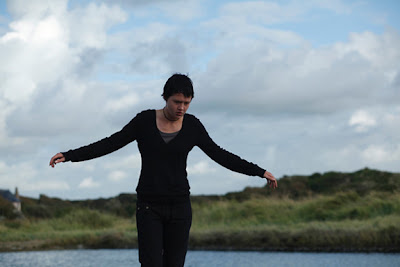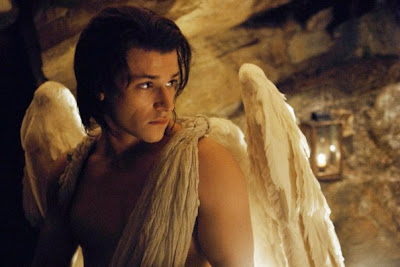I used to jump at the chance to see any new film from
Claude Sautet (1924-2000), a filmmaker who made excellent use of some of the finest actors from two generations of French film --
Yves Montand,
Romy Schneider,
Michel Piccoli,
Lino Ventura and later
Emmanuelle Béart,
Daniel Auteuil,
Sandrine Bonnaire,
Vincent Lindon -- and whose movies almost always seemed to capture life as it is, generally messy, and from angles/characters/situations we rarely saw elsewhere.
Sautet, shown at top and at right, also always made me think of his
homophone (I believe I am using this term correctly),
sauté -- that form of cooking in which all the ingredients are pan-fried together quickly, and moved rapidly around the pan to keep them tasty and never overcooked. You could easily apply this to Sautet's movies, often fast-moving ensemble pieces that catch their characters on the run, as it were, living (and sometimes dying) as best they can. There is a melodramatic element to his work that puts some people off, but which, since I enjoy a good melodrama, never much bothered me. Despite this, Sautet remained a subtle filmmaker (little in his work is overcooked) who always drew wonderful performances from his casts.
The
Film Society of Lincoln Center's tribute to the movie-maker is currently in full swing, but there is still time to see a number of the films included. (You can discover the entire program
here.) If you have never seen it, I would recommend above all the rest, Sautet's first "real" film (he made an earlier one as a director "for hire"),
Classe tous risques (1960), which was shown this past Thursday (but the wonderful Criterion transfer of which can be rented from
Netflix). This amazing movie -- part noir, thriller, family film, chase movie and soap-opera rolled into one wonderful mix -- features Lino Ventura (above, with gun) and
Jean-Paul Belmondo (below, with
Sandra Milo, in his first role after
Breathless), and both men give sensationally good performances.
For those who especially want to learn more about this filmmaker, don't miss the documentary to be shown tomorrow, Sunday, August 5, at noon titled
Claude Sautet or the Invisible Magic, in which, months before the filmmaker's death from cancer in July 2000,
Positif film critic
N.T. Binh and his collaborator
Dominique Rabourdin had extensive audio interviews, in which the dying director discussed his body of work in sometimes candid detail. The conversations were then illustrated with film clips and combined with additional interviews with Sautet’s friends, collaborators and admirers to form this unusual portrait.
TrustMovies is sorry that he could not get this post up earlier, but he only yesterday saw the supposed jewel of this retrospective --
Max et les ferrailleurs (from 1971 and which translates roughly to
Max and the Scrap-Metal Guys) which closes the Sautet program with a one-week theatrical showing -- the first it has ever received here in the USA. Unfortunately, it is not a very good film and is one of Sautet's weaker efforts, so I can better understand why it has not been seen here until now.
I don't mean to imply that there are not some
very good things about the movie, starting with the fine performance of its leading lady Romy Schneider, above, who has one of her best roles here as Lily, the prostitute girlfriend of the poor pawn of a petty criminal, Abel (
Bernard Fresson, below, right), who has the bad luck to cross the path of the film's non-hero, a nut-case policeman (the titular Max), played in his usual close-to-the-vest style by Michel Piccoli.
Basically the movie is about "entrapment," though the word is never used. Perhaps it was unknown to the French back in 1971, but here in the USA is was certainly known to us gays, who were forever being entrapped by our own police. In this story, no one is gay (or at least no one is "out"), but Max -- who has just arrived on the scene
after a bank job has been pulled, with the robbers having escaped -- is determined to catch some gang, any gang, red-handed. Because he cannot get to the
real bad guys, he creates a group of news ones who will be caught in the act and thus teach the actual criminals a lesson. Huh? Yes, and to that end he goes about tempting and finally inducing Abel to plan and execute a heist via the relationship Max has established with Lily by posing as a rich banker who fancies this very attractive young lady. Don't ask. (Thank goodness our cop comes from, and is estranged from, a wealthy family of vintners, so he can afford to live the double life he now leads.)
Max's entire plan does not even involve
the gang of bank robbers whom the police know pulled that most recent bank job, yet Max is certain that simply seeing another gang of robbers caught in the act will dissuade the rest of the bad guys from their planned heists. Sure. And if the French police believe this nonsense (a few eye-brows are raised but everyone finally goes along with this plan), I have a certain tower in the middle of Paris I'd like to sell them. The premise, in fact, is borderline ridiculous. Even as Sautet and his co-writers unfold their tale, it begins early on to seem manufactured. Well, as I mentioned, this filmmaker tends to deal in melodrama.

Along the way the movie is full of stupidity holes: Why would the police assume that Lily, having been told by Max of the date that the bank will be rolling in money, would immediately run and tell the entire gang -- including, of course, the police informer (every gang here seems to have one), rather than simply telling Abel in private? In a sense, the biggest problem with the movie is Max himself -- despite Mr. Piccoli's fine work -- who is a character so thoroughly manufactured, back story and all, that when he and his plan go into action, the movie's plot falls into place like a line of recently-standing dominoes.
The wild card here, as it so often proves, is love. How you react to the film's finale will depend on how much you believe in the Max/Lily connection. For me, and again, despite the simply tremendous performance from Ms Schneider, this was just some more "manufacture."
Max et les ferrailleurs, newly restored and with new subtitles from
Rialto Pictures, opens this coming Friday, August 10 for a week's run at the
Elinor Bunin Muroe Film Center.























































